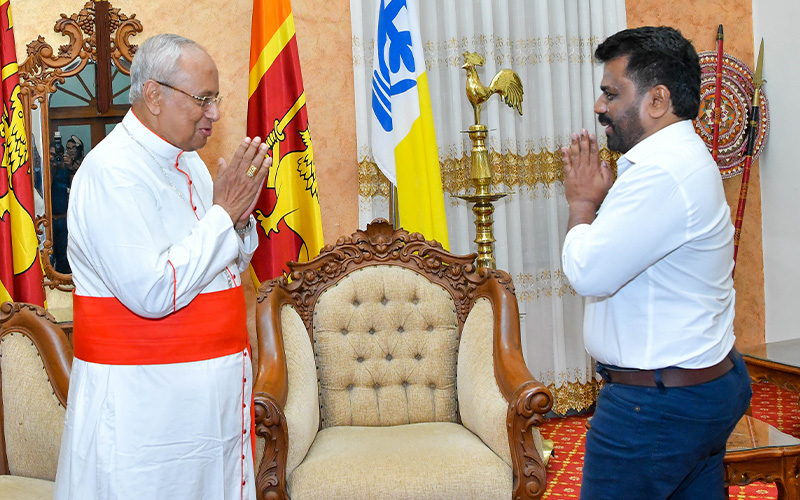
Archbishop of Colombo, Malcolm Ranjith, delivered a scathing critique of the Sri Lanka’s Constitution, labelling it “dictatorial” and a “death blow” to democracy, calling for its repeal.
Speaking at a service held at All Saints’ Church in Borella, the Cardinal questioned the legitimacy of Independence Day celebrations and called for the immediate repeal of the 1978 Constitution, which he described as the root cause of the country’s systemic failures.
“Whose freedom are we celebrating today?” the Cardinal asked. “The freedom of the rulers or the freedom of the people?”
The Cardinal highlighted the Constitution’s role in fostering a culture of fear, pointing to decades of media suppression, enforced disappearances, and the infamous white van abductions. He emphasised how the unchecked powers of the Executive had allowed political opponents to be silenced, journalists to disappear, and justice to be subverted.
“The dictatorial Constitution is the root cause of all the disasters in this country,” he said. “It is the source of the terror culture that has soaked our modern democracy in blood, enabling corruption and lawlessness.”
He linked these oppressive practices to the country’s devastating economic decline, adding that the Constitution enabled successive governments to manipulate the law, undermine the judiciary, and exercise parliamentary power without accountability. “No one with a conscience can support the current Constitution anymore,” he declared.
The Cardinal reminded the congregation of the arrogance displayed by political leaders when the 1978 Constitution was first introduced, claiming the Constitution was so powerful that it could do everything except “turn a man into a woman or vice versa.”
He argued that this centralisation of power in the hands of one individual had reduced the Legislature to a mere pawn of the Executive, stripping the Judiciary of its independence and allowing corruption and injustice to flourish.
For Cardinal Ranjith, the solution lies in an immediate and complete overhaul of the country’s legal framework.
The remarks mark a change of heart for the Cardinal who previously faced criticism for his lack of concern about the plight of Tamil priests, arrested by the military in Mullivaykal in May 2009 and has been accused of supporting the government’s land grabbing and militarisation.
In 2012, as Bishop of Mannar, Rayappu Joseph and other members of the wrote to the UN Human Rights Council, Cardinal Ranjith said the Catholic Church in Sri Lanka rejected any moves for an international accountability mechanism and claimed "such efforts by western powers is an insult on the intelligence of the people of Sri Lanka".
In 2013, Ranjith, slammed any notion of foreign intervention in Sri Lanka, writing
"Foreigners should not tell us what to do... We are not a pack of fools".
Later that year he said neither he nor any of the bishops on the island will indulge in politics or affiliate themselves with a political party or group
In 2014, as Catholic bishops called for an international investigation into Sri Lanka’s use of cluster bombs and chemical weapons against Tamil civilians in a meeting with US officials, Ranjith said the Catholic Church in Sri Lanka did not support those allegations.
In 2015, he called for a review of parties based on ethnic and religious lines, saying they were “inimical” to social cohesion.
The ethnically Sinhalese archbishop has also defended the Buddhist nature of Sri Lanka, stating,
"The prominence of the country relies on Buddhism and there should not be any decision to change its due place secured by the constitution as we all live in a country nourished by Buddhism".
Last year, he called upon Sri Lanka’s political leaders to follow and safeguard Buddhism.
He maintained that Sri Lanka is a nation “rooted in Sinhala Buddhist traditions” and described those who failed to recognise this as “foolish”. Malcolm Ranjith also warned political leaders against disregarding the will of the Buddhist Sangha.
The statement followed Ranjith’s call for a ban on all political parties “based on religion and language,” a move that has previously been proposed by Sri Lanka’s prime minister and one that may have dire consequences for the island’s Tamils and Muslims.
Besides from being seen as an apologist for the Sri Lankan state and the Rajapaksa’s in particular, Ranjith’s address to the UN Human Rights Council is remarkably different from his previous views on human rights.
See an excerpt from a 2018 address delivered by the archbishop below.
“Human rights have become the new religion in the Western world. In the past, there was no such thing as human rights but people lived with love and respect and trust in God. This is like a wonderful new discovery they keep in mind and they always tell us that. Religion in European countries often referred to as human rights, is like wearing a coat. Somewhat which you can wear when you need it and throw it away when you don’t need it. Religion is practiced when an advantage is needed and religion is discarded when a sacrifice is needed. This is spreading in our country as well. Some of them are talking about a secular society. There is no secular society. People’s lives are not limited to food, clothing, and comfort. If we believe in religion, we do not need to talk about human rights. We can live beyond human rights. The religions we believe in have human rights. What else is needed? So dear brothers and sisters, we should not be deceived by this magic. We must act wisely here.”
